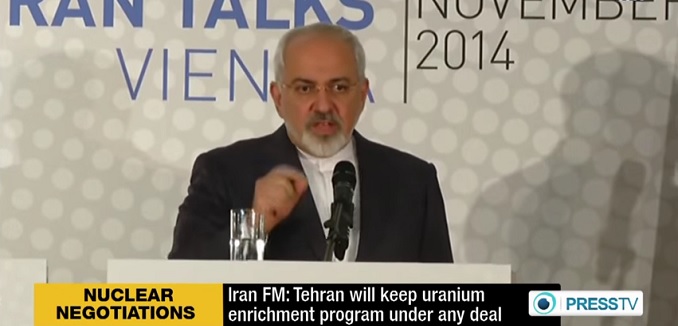The P5+1 powers on Monday failed to reach an agreement with Iran over its nuclear program following a year of negotiations, and announced instead that talks would be extended through June 2015.
Buzzfeed Politics noted that the parties had “not even produced a framework agreement,” which Iranian officials had floated as likely the day before.
Iran will reportedly receive approximately $700 million per month in frozen assets per the terms of the extension, a concession likely to deepen fears that Iran may be seeking to indefinitely trade reversible nuclear concessions for irreversible financial relief. The scenario had been raised as a concern by skeptics of the interim Joint Plan of Action (JPA) almost immediately after it was announced last winter in Geneva. Criticism that the extension would be more of the same emerged over the weekend and into Monday. The Wall Street Journal had reported on Sunday that U.S. officials are increasingly concerned that Tehran is indeed looking to negotiate indefinitely, after the interim deal provided Iran with financial windfalls valued in the billions of dollars, helping to partially restore Iran’s economy.
Mark Dubowitz, the executive director of the Foundation for Defense of Democracies (FDD), tweeted that Western economic leverage “continues to diminish.” There are also fears that Iranian leverage has increased as the West’s has eroded, with Tehran continuing to enrich and stockpile uranium, an asset that Iran can potentially trade away for other concessions. Other analysts suggested that the dynamic may not be one of leverage at all, but instead one in which Iranian political realities make cutting a robust deal impossible.
The Wilson Center’s Aaron David Miller and Jason Brodsky emphasized on Monday that Iranian negotiators are not empowered to make the necessary concessions on their own, but that instead they have to answer to Supreme Leader Ayatollah Ali Khamenei. Analysis by FDD fellow Michael Ledeen noted that that the political reality may put a deal out of reach, inasmuch as almost a decade of Iranian behavior indicates that Khamenei simply “does not want a deal with the United States” for ideological reasons.
[Photo: PressTV News Video / YouTube]




